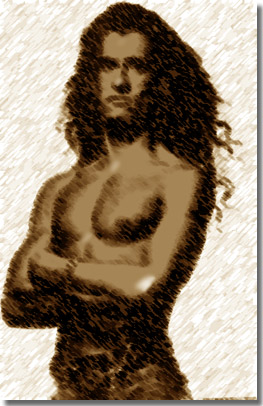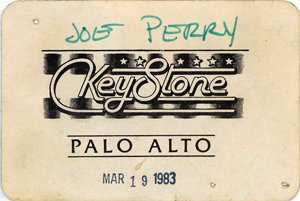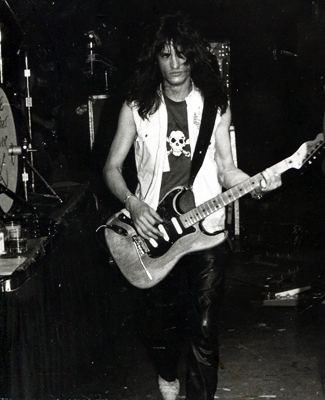
| Search JoyZine with Google Site Search! |
The Joe Perry Project
Interview by Keith Putney & Joy Williams The following interview was conducted in 1983. Crouching (literally) in the kitchen at the Keystone Palo Alto, we interviewed Joe Perry, who said all the right things for print, but seemed quite depressed, actually. In 1979 Joe Perry decided to leave Aerosmith and go solo. The band he put together then, The Joe Perry Project, has been through a number of changes in the intervening years, but Perry feels that he finally has the combination of people he can feel comfortable with, both on and off stage. With a brand-new album, Once A Rocker, Always A Rocker, Perry is ready to hit the road again for what he enjoys the most: direct communication with his audience. A short while ago, while still working on the new album, he talked to us about what he has been doing and his feelings about rock and roll. Q: I know you've toyed around in the past with the idea of doing things with other people. Is that.... JOE: I've got so much going on right now, I look at that a little bit down the line. I'm doing the original songs for a movie staring Leif Garrett and Matt Dillon, Making It. I'd doing the original sound track and producing the album. So between the new album and the sound track, I'm keeping pretty busy. Q: I heard that you are going to be playing a part in the movie. JOE: It's just a cameo; they wanted a rock'n'roll star for a scene. But the main thing for me is the songs, because for the first time I have to write my songs according to a script, as opposed to the other way around, as in video where you write the song and then they put the video around it. Q: You've been in the music business for more than ten years now where you've been playing in recording bands. Do you think there's been any great change in the music in that time? JOE: Yeah. Well, there's obviously the cult things—punk or heavy metal—but it's all basically rock'n'roll. It hasn't changed that much. There've been a lot of good, creative things, but it's just rock'n'roll the same as it was in the '50s. The tones on the guitars change a little bit, the reverb changes, but it's still the same stuff that gets people off. Q: How about the business itself? JOE: The business has really fluctuated. It's really... I think the business is in the middle between the artists and the people who want to see the artists. The business had gotten really fat, and suddenly the economy dropped. There are so many labels that went bankrupt in the last couple of years that it's really changed the business around. Q: For better or for worse?
JOE: Well, probably better, because I hate dealing with businessmen—except for my manager and my lawyers and my accountants. I don't know, it's just gotten so self-important that it's hard. That's why I consider myself lucky that I can go out and play places without a record and I don't have to put up with the politics. There are obviously exceptions, but a lot of the people in it are businessmen; it's a way to make money. And they don't really listen to the feedback from the artist sometimes—and sometimes they don't listen to the feedback from the audience. They just go with what's tried and true a lot of the time and not go out on a limb. I've heard a lot of good bands that should be on vinyl and a lot of shitty bands that are on vinyl. Q: We have a lot of readers who are in bands right now who are trying to "make it." Any advice? JOE: All I can say is that you've gotta keep doing it and doing it right. That's all. That's what worked for me. With various changes, I reached a certain place.... I suppose '76 was the epitome of it for me. And now it's starting to happen for me again. Q: It's almost like starting over? JOE: Yeah! Except that I've got my foot in the door. Q: Is there anything else you could imagine yourself doing, or is this basically it for you? JOE: I'd probably be in jail. Q: I've heard musicians say that one of the reasons they've lasted so long is that they just couldn't do anything else, that they'd go crazy without it, that they just have to express themselves.... JOE: Oh, yeah. I definitely have to have my rock'n'roll fix. Give me twelve hours a day of this stuff. I get charged in the morning—I put on some real loud rock'n'roll. It's there and you get a natural high off of it. No matter how drunk you get before you go on, after three songs, you're straight. There's something about it. Q: Is it the music or the performing—or both? JOE: Oh, it's both. It's the energy and having a good time; trying to do something a little different every night. And it's a live high, it happens right there. That's what keeps it going for me. |


